Review in the "Canadian press" about Anna's Traviata in San Francisco:
Russian soprano Anna Netrebko lights up opera stage in 'La Traviata'
SAN FRANCISCO — From the moment she rolls on stage in a 1929 Buick for the opening party scene of Verdi's "La Traviata," Anna Netrebko pretty much obliterates everything in her path.
Just try taking your eyes off the Russian soprano as she sings and acts her way through the role of Violetta, a 19th-century Parisian courtesan who falls in love, makes a noble sacrifice and eventually dies of tuberculosis.
Netrebko, at 37, is an opera star at the height of her considerable powers. And her appearance is unquestionably the highlight of the San Francisco Opera's annual "summer season," though the other productions - Puccini's "Tosca" and Gershwin's "Porgy and Bess" - have much to recommend them.
Heard at the third of her five performances Friday night, Netrebko showed she has kept her creamy voice, tinged with melancholy, in good repair. If anything, it sounds fuller than before she took a pregnancy sabbatical last year, yet she controls it so expertly that she has no trouble pulling off the coloratura flights of "Sempre libera" or floating soft high notes in her death scene. She has retained some of the weight she gained but still looks glamorous in costumes that range from a sleeveless evening gown to a negligee.
Netrebko is a San Francisco favorite, having made her U.S. debut here in 1995. But it had been five years since she last sang with the company, so it was a particular plum to have her perform Violetta for the first time in the U.S. (She is due to sing it at New York's Metropolitan Opera in the 2010-11 season.)
Though she has by now portrayed the role dozens of times in other houses, her performance feels spontaneous and free of mannerism. Small, telling touches abound - the way she spits out the word "Gioir!" (Joy!) as she desperately asserts her preference for the high life over a commitment to her young suitor, Alfredo; her nervous impatience when his father first lectures her about the shame she is bringing to his family; or the final image, standing atop her bed with arms outstretched, then crumpling lifeless in an instant.
If only her co-stars were worthier foils. As Alfredo, tenor Charles Castronovo sang pleasantly but neither his personality nor his sound had enough heft to make it plausible that he could be more than a passing fancy for this Violetta. Similarly, baritone Dwayne Croft's burnished baritone was pressed to the limits as Alfredo's father, Giorgio Germont. The effort seemed to narrow his emotional range, denying him the force of character that could believably inspire the heroine's renunciation.
Donald Runnicles, the company's music director and principal conductor who is being replaced after 17 years by Nicola Luisotti, conducted the excellent orchestra with evident affection both for the players and the score.
The production by Marta Domingo, on loan from the Los Angeles Opera, turns Violetta into a flapper of the Roaring '20s. That works well enough in the first act, but makes nonsense of the story thereafter. The idea that she would renounce her lover to protect the reputation of his family doesn't transfer well, nor does the likelihood she would die of tuberculosis.
And though the antique car is an eye-popping effect, other liberties are gratuitous, such as making Alfredo rush back in at the end of "Sempre libera" so the lovers can fall into each other's arms, or having the dying Violetta hallucinate about her wedding day.
Dubious updating, though to less distracting effect, is also on display in "Porgy," which director Francesca Zambello, in a production first seen at the Washington National Opera, has moved from the 1920s to the 1950s. The elaborate set for Catfish Row looks like an odd cross between a shantytown and a prison cell block, but the movable scenery allows the action to flow without interruption.
The breakout performance here is by bass-baritone Eric Owens, who as Porgy commands the stage with a warm, sympathetic voice and presence. Soprano Laquita Mitchell looks terrific as Bess, and sounds fine most of the time, but the high notes occasionally give her problems and her voice lacks the plushness ideal for the role. In supporting roles, soprano Angel Blue is a standout as Clara, with a shimmering "Summertime," and Karen Slack brings emotional fervor to "My Man's Gone Now." John DeMain, who led the historic Houston performances of the work in 1976 that restored "Porgy" as grand opera, conducted with authority gained from long association with the score.
"Tosca," one of the most tightly constructed melodramas in the operatic repertory, requires a soprano with great vocal and dramatic presence. Adrianne Pieczonka is very effective in the role, and her second-act confrontation with the evil Baron Scarpia, well sung and acted by baritone Lado Ataneli, is the chilling climax it should be. Tenor Carlo Ventre, as the painter Cavaradossi, is not quite on their level. He has a powerful voice, but it's blunt and unrefined, and he's prone to holding onto his high notes a bit too long - as if to show off his lung power.
Despite the anemic economy, the company seems to be attracting healthy audiences for this mini-season, which runs from June 2-July 5. All five of Netrebko's performances sold out (the final four will be shared by Elizabeth Futral and Ailyn Perez) as did all performances of "Porgy." "Tosca" drew a crowd of 27,000 to a free simulcast at the Giants' baseball stadium, which the company says is the most since opera-in-the-ballpark became a regular event.
It feels so, so good to read such articles. They are all showing again and again that Anna is really back, that she is even better then before and that nothing has changed ! She's still the same - simply our Anna <3
A favorite bass performance from Ben Miller
vor 2 Stunden
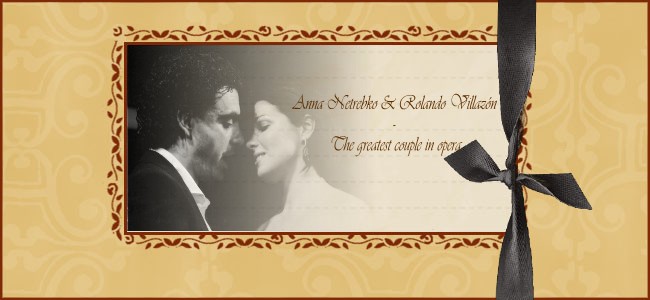

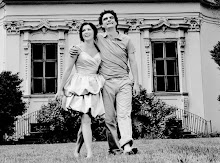
.jpg)

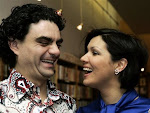

.jpg)

.jpg)


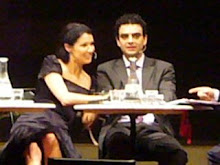.jpg)


.png)
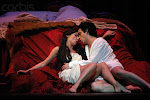


.jpg)
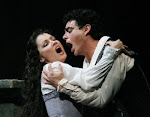.jpg)
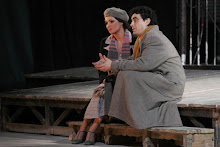.jpg)
.jpg)
.jpg)
.jpg)
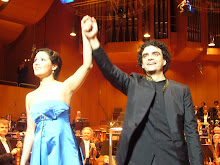.jpg)


.jpg)


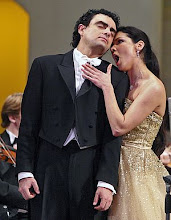.jpg)
.jpg)


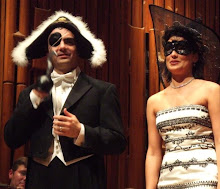


.jpg)
.jpg)

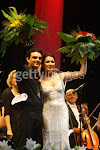
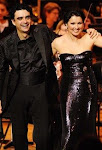.bmp)
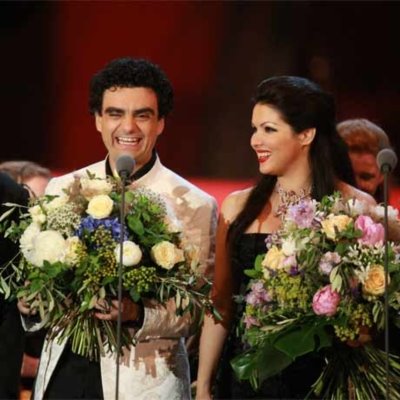
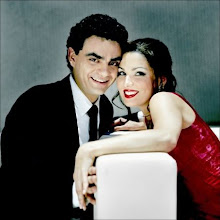
.jpg)

.jpg)




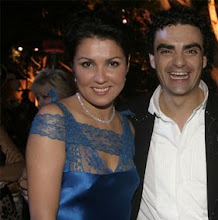+2.jpg)
.jpg)



















4 Kommentare:
So... "As Alfredo, tenor Charles Castronovo sang pleasantly but neither his personality nor his sound had enough heft to make it plausible that he could be more than a passing fancy for this Violetta." Ok, so this is a confirmation to me: she really misses Rolando onthe stage! There´s no other dream partner for Anna in the hole word! Thanks, Christina! Can´t wait to see them back together!
Personne ne peut remplacer Rolando auprès d'Anna car leur accord vocal et scènique est exceptionnel et inégalable.
Attendons...
Yeah the chemistry between Anna and Rolando is unique...the reason why I made/make this blog...
And the reason I love your Blog, dear Christina! =) I like to think this chemistry is just "on the stage", cause they are both so talented and have the same idea of how´s art soposed to be, and i love to imegen they are very god friends! But he´s unreplacabe, Anna knows that us god as we do!=)
Kommentar veröffentlichen